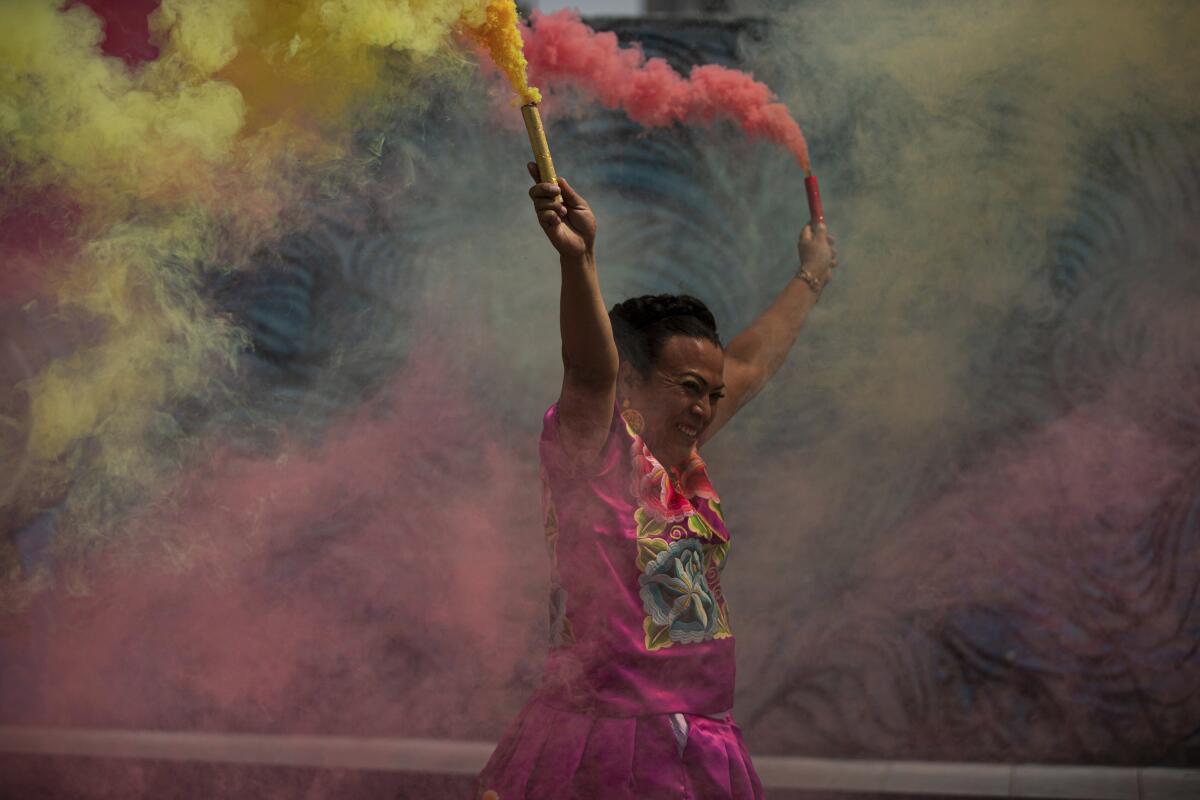More than 100 LGBTQ candidates compete in Mexican election

- Share via
MEXICO CITY — For years, transgender activist Roshell Terranova protested in the streets and knocked on the doors of Mexico’s Congress to make the demands of the country’s LGBTQ community known. Now thanks to her efforts and an electoral rule change, Terranova is running for Congress in a first for Mexico.
Terranova will be one of more than 100 members of Mexico’s LGBTQ community participating in Sunday’s midterm election, which will fill the 500 seats of the lower chamber of Congress, as well as state and local posts across the country. It is the largest number of LGBTQ candidates in Mexico’s history, said Carla Humphrey, an official with the National Electoral Institute.
The likelihood of their success for some of the more than 20,000 posts in play Sunday remains unknown, but activists, analysts and members of the community say the sheer number of candidates is a victory. It signals a departure from a history of hiding sexual identity to pursue a political career.
The surge in LGBTQ participation follows an order from electoral authorities for political parties to include those candidates on their slates as part of their “affirmative action” efforts, which seek “to generate and open spaces to vulnerable groups,” Humphrey said.
“They must be made visible and have a voice and be able to influence,” Humphrey said.
Electoral authorities plan to track their progress as they have with women and other groups that have faced discrimination and benefited from actions to promote their participation, such as Indigenous groups, Afro-Mexicans, people with disabilities and Mexicans who live abroad, she said.
Patria Jiménez, another activist and candidate to become a local lawmaker, in 1997 became the first federal congresswoman who has come out as gay. She said the high level of participation this year is the result of a “social evolution” that the LGBTQ activists won protesting in the streets.
Marven, a transgender woman from the state of Oaxaca, is running for a seat in Mexico City’s legislative body as a candidate for the small party Elige. “We have marched for many years to be taken into account,” she said. The name Marven is a combination of her two legal last names, which she was required to use on the ballot, because she has not legally changed her name.
But her ballot entry will also include her nickname, “Lady Tacos de Canasta,” which she earned when a video circulated on social media in 2016 of her selling a specific kind of fried and steamed taco from a basket during a gay pride parade.
Minority political parties such as Citizen Movement, Progressive Social Networks and the Democratic Revolution Party registered dozens of LGBTQ candidates, exceeding the quotas set by electoral authorities. The largest parties just met the requirements.
Citizen Movement has the most, including 51 gays, 26 lesbians, 16 transgender candidates and four bisexual women.
From the patio of her home, known as Casa Club Roshell, Terranova celebrated the close of her campaign by singing “Cabaret.” The house has been a cultural center and refuge for members of the LGBTQ community in Mexico City for 17 years.
“Before, you couldn’t come out of the closet because you were condemned to a life of physical, mental, social, workplace torture and you were excluded everywhere,” Terranova said.
If she wins office, she will fight to bring same-sex marriage to the whole country, Terranova said. Mexico’s Supreme Court has ruled that bans on same-sex marriage are unconstitutional, but some states still have not passed legislation allowing it. In those cases, couples have been able to go to court to be allowed to marry. Terranova also plans to push legal reforms to allow the civil registration of transgender youths and require medical attention “without discrimination.”
Ana Labambarri, an analyst at the Mexican Institute for Competition, expressed doubt about the influence winning LGBTQ candidates could have. Based on the institute’s study of women who have won seats in local legislative bodies, they still have not been able to access positions that allow them to take important decisions, because of structural problems associated with a patriarchal system. She said LGBTQ lawmakers probably would face similar obstacles.
Among the people recently celebrating the close of Terranova’s campaign was Fabiola Del Castillo, a 42-year-old graphic designer whom Terranova helped through her own gender transition four years ago.
Del Castillo said the candidacies of Terranova and others give her hope that the discrimination they face will stop.
“I hope that it helps end the hate toward us and we can go out in the street or into a restaurant without facing discrimination,” she said.
More to Read
Sign up for Essential California
The most important California stories and recommendations in your inbox every morning.
You may occasionally receive promotional content from the Los Angeles Times.










